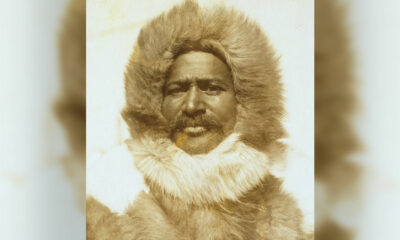Mississippi Today
In final words to voters, Reeves stokes fear and Presley pitches new ideas

Welcome to The Homestretch, a daily blog featuring the most comprehensive coverage of the 2023 Mississippi governor’s race. This page, curated by the Mississippi Today politics team, will feature the biggest storylines of the 2023 governor’s race at 7 a.m. every day between now and the Nov. 7 election.
Ballots are printed, polls are open and voters are ready to end this awfully contentious 2023 governor’s race.
There’s good reason the nation is closely watching what happens in Mississippi today in the race between Republican Gov. Tate Reeves and Democratic challenger Brandon Presley.
Republicans are hoping to continue their 20-year reign of the governorship and further their so-far successful effort to make Mississippi a one-party state. Democrats, meanwhile, haven’t had this much hope for a win since arguably 2003, when then-Gov. Ronnie Musgrove got beat by Republican challenger Haley Barbour.
For Republicans, that 2003 election was the beginning of what has become a nearly total grip on Mississippi government. For Democrats, it was the beginning of the end.
But today, Democrats have real reason to think they can reclaim some of that GOP control.
Reeves, one of the most prominent political fundraisers in the state’s history, has been outraised by $5 million. He’s consistently polled as unpopular, yet he faces a smooth-talking, affable cousin of Elvis, one of the state’s most beloved celebrities. He’s struggled to enthuse Republican voters ahead of today’s election, yet he faces an apparently fired up electorate targeted by the most broadly coordinated get-out-the-vote effort Democrats have waged in recent history.
Contemplating these strong headwinds in the last month of the campaign, the first-term Republican governor leaned into one major campaign theme: Fear. He’s worked to make Mississippians feel afraid of an impending infringement on “Mississippi values.” He and his allies have tried to convince voters that Presley is beholden to national Democrats, ignoring the fact that Democratic Party voters have recently made up nearly 50% of the state he leads.
The governor has pitched few new ideas all cycle, and he certainly hasn’t focused on them in the run-up to Election Day. Instead, he’s chosen to dwell on fear, fear and fear.
The final words many voters will hear from Reeves before they cast their votes today say it all: “The out-of-state liberals don’t just want to change governors; they want to change Mississippi. That’s what this race is about. The only thing that stands in their way is you and me. Let’s make our stand.”
Presley, on the other hand, has floated new policies to, he says, move the state forward. Yes, he has weaved in attacks of Reeves at every given opportunity, and yes, Mississippians are certainly tired of it. But in the same breath, he has contrasted Reeves’ record with three of his own ideas since the day he announced his candidacy in January.
Presley wants to expand Medicaid to provide health coverage to 200,000-plus Mississippians and address the state’s worsening hospital crisis, a policy change Reeves has long refused. He wants to clean up corruption in state government, pointing out regularly that Reeves himself has many ties to the state’s massive welfare scandal. And he wants to cut the state’s highest-in-the-nation grocery tax and car tag fees, ideas he says Reeves hasn’t worked to do in 12-plus years of prominent leadership roles.
“I understand where working people are in Mississippi,” Presley says in his final ad before Election Day. “Everybody cannot be born rich and lucky, and that’s why you need a governor that will stand up for the values of Mississippi. I’m running this race on the values that I learned in my small hometown where I was mayor and I cut taxes twice.”
But seriously, you may ask, isn’t Mississippi still the Mississippi that most of those folks watching around the nation think it is? Reeves today very well could earn the support many would expect of a Republican incumbent in this red state. Perhaps the Republican and Democratic pollsters who have been crunching the numbers are wrong, and Reeves isn’t nearly as unlikable as the data have shown.
Maybe the fear mongering from Reeves worked, and maybe Presley, who’s still not very well known in all parts of the state, couldn’t convince enough Mississippians that he’s not the big, bad liberal Reeves has made him out to be. Maybe Presley’s influx of cash from out-of-state Democrats scared off too many of the voters he’s been targeting.
But maybe the pollsters are right about Reeves and Mississippians are ready for a change in leadership. Maybe Presley did, in fact, do enough to sell voters on electing a leader with different ideas for the future. Maybe Mississippi voters aren’t falling for the fear tactics of Reeves.
That’s a whole lot of “maybes.” Maybe that’s why the country is watching so closely today.
We’ll know in a few hours.
Headlines From The Trail
Reeves, Presley make final campaign stops on the politically do-or-die Gulf Coast
Meet five young Mississippians voting for the first time on Nov. 7
Podcast: Chuck Todd, Curtis Wilkie discuss 2023 governor’s race
A Democratic governor in Mississippi? He thinks it’s possible.
The Mississippi governor’s race hasn’t been this competitive in 20 years
Elvis Presley’s cousin, an anti-abortion Democrat, on cusp of unlikely Mississippi victory
Dems find out tomorrow if ‘Blue Dog’ candidate will flip red-state Miss.
Elvis Presley’s cousin Brandon eyeing huge upset in Mississippi
What We’re Watching
1) The results, of course. Mississippi Today is your one stop Election Day source for previews, what to watch for, analyses, and real-time election results. Once results start rolling in at 7 p.m., this link on our site will have the live results.
2) Voting irregularities, polling place problems, hacked state computer systems, or scams. If you hear of anything or see anything, first call the Mississippi Secretary of State’s election hotline at 800-829-6786. If you’re inclined to report to us, we will do our best to get answers for you. Send concerns or questions to adam@mississippitoday.org.
3) Will there be a runoff? Republican and Democratic consultants have made it clear that they’re geared up for a Nov. 28 runoff if neither Reeves nor Presley gets 50% of the vote today. And one more thing to note: If the election is as close as some predict, a winner might not be known tonight. Mississippi Today’s Bobby Harrison breaks down this vote-counting scenario.
This article first appeared on Mississippi Today and is republished here under a Creative Commons license.
Did you miss our previous article…
https://www.biloxinewsevents.com/?p=303374
Mississippi Today
On this day in 1909, Matthew Henson reached the North Pole
April 6, 1909

Matthew Henson reached the North Pole, planting the American flag. Traveling with the Admiral Peary Expedition, Henson reportedly reached the North Pole almost 45 minutes before Peary and the rest of the men.
“As I stood there on top of the world and I thought of the hundreds of men who had lost their lives in the effort to reach it, I felt profoundly grateful that I had the honor of representing my race,” he said.
While some would later dispute whether the expedition had actually reached the North Pole, Henson’s journey seems no less amazing.
Born in Maryland to sharecropping parents who survived attacks by the KKK, he grew up working, becoming a cabin boy and sailing around the world.
After returning, he became a salesman at a clothing store in Washington, D.C., where he waited on a customer named Robert Peary. Pearywas so impressed with Henson and his tales of the sea that he hired him as his personal valet.
Henson joined Peary on a trip to Nicaragua. Impressed with Henson’s seamanship, Peary made Henson his “first man” on the expeditions that followed to the Arctic. When the expedition returned, Peary drew praise from the world while Henson’s contributions were ignored.
Over time, his work came to be recognized. In 1937, he became the first African-American life member of The Explorers Club. Seven years later, he received the Peary Polar Expedition Medal and was received at the White House by President Truman and later President Eisenhower.
“There can be no vision to the (person) the horizon of whose vision is limited by the bounds of self,” he said. “But the great things of the world, the great accomplishments of the world, have been achieved by (people with) … high ideals and … great visions. The path is not easy, the climb is rugged and hard, but the glory at the end is worthwhile.”
Henson died in 1955, and his body was re-interred with full military honors at Arlington National Cemetery. The U.S. Postal Service featured him on a stamp, and the U.S. Navy named a Pathfinder class ship after him. In 2000, the National Geographic Society awarded him the Hubbard Medal.
This article first appeared on Mississippi Today and is republished here under a Creative Commons Attribution-NoDerivatives 4.0 International License.![]()
Mississippi Today
A win for press freedom: Judge dismisses Gov. Phil Bryant’s lawsuit against Mississippi Today
Madison County Circuit Court Judge Bradley Mills dismissed former Gov. Phil Bryant’s defamation lawsuit against Mississippi Today on Friday, ending a nearly two-year case that became a beacon in the fight for American press freedom.
For the past 22 months, we’ve vigorously defended our Pulitzer Prize-winning reporting and our characterizations of Bryant’s role in the Mississippi welfare scandal. We are grateful today that the court, after careful deliberation, dismissed the case.
The reporting speaks for itself. The truth speaks for itself.
This judgment is so much more than vindication for Mississippi Today — it’s a monumental victory for every single Mississippian. Journalism is a public good that all of us deserve and need. Too seldom does our state’s power structure offer taxpayers true government accountability, and Mississippians routinely learn about the actions of their public officials only because of journalism like ours. This reality is precisely why we launched our newsroom nine years ago, and it’s why we devoted so much energy and spent hundreds of thousands of dollars defending ourselves against this lawsuit. It was an existential threat to our organization that took time and resources away from our primary responsibilities — which is often the goal of these kinds of legal actions. But our fight was never just about us; it was about preserving the public’s sacred, constitutional right to critical information that journalists provide, just as our nation’s Founding Fathers intended.
Mississippi Today remains as committed as ever to deep investigative journalism and working to provide government accountability. We will never be afraid to reveal the actions of powerful leaders, even in the face of intimidation or the threat of litigation. And we will always stand up for Mississippians who deserve to know the truth, and our journalists will continue working to catalyze justice for people in this state who are otherwise cheated, overlooked, or ignored.
We appreciate your support, and we are honored to serve you with the high quality, public service journalism you’ve come to expect from Mississippi Today.
READ MORE: Judge Bradley Mills’ order dismissing the case
READ MORE: Mississippi Today’s brief in support of motion to dismiss
This article first appeared on Mississippi Today and is republished here under a Creative Commons Attribution-NoDerivatives 4.0 International License.
Mississippi Today
Meet Willye B. White: A Mississippian we should all celebrate
In an interview years and years ago, the late Willye B. White told me in her warm, soothing Delta voice, “A dream without a plan is just a wish. As a young girl, I had a plan.”
She most definitely did have a plan. And she executed said plan, as we shall see.
And I know what many readers are thinking: “Who the heck was Willye B. White?” That, or: “Willye B. White, where have I heard that name before?”
Well, you might have driven an eight-mile, flat-as-a-pancake stretch of U.S. 49E, between Sidon and Greenwood, and seen the marker that says: “Willye B. White Memorial Highway.” Or you might have visited the Olympic Room at the Mississippi Sports Hall of Fame and seen where White was a five-time participant and two-time medalist in the Summer Olympics as a jumper and a sprinter.
If you don’t know who Willye B. White was, you should. Every Mississippian should. So pour yourself a cup of coffee or a glass of iced tea, follow along and prepare to be inspired.
Willye B. White was born on the last day of 1939 in Money, near Greenwood, and was raised by grandparents. As a child, she picked cotton to help feed her family. When she wasn’t picking cotton, she was running, really fast, and jumping, really high and really long distances.
She began competing in high school track and field meets at the age of 10. At age 11, she scored enough points in a high school meet to win the competition all by herself. At age 16, in 1956, she competed in the Summer Olympics at Melbourne, Australia.
Her plan then was simple. The Olympics, on the other side of the world, would take place in November. “I didn’t know much about the Olympics, but I knew that if I made the team and I went to the Olympics, I wouldn’t have to pick cotton that year. I was all for that.”
Just imagine. You are 16 years old, a high school sophomore, a poor Black girl. You are from Money, Mississippi, and you walk into the stadium at the Melbourne Cricket Grounds to compete before a crowd of more than 100,000 strangers nearly 10,000 miles from your home.
She competed in the long jump. She won the silver medal to become the first-ever American to win a medal in that event. And then she came home to segregated Mississippi, to little or no fanfare. This was the year after Emmett Till, a year younger than White, was brutally murdered just a short distance from where she lived.
“I used to sit in those cotton fields and watch the trains go by,” she once told an interviewer. “I knew they were going to some place different, some place into the hills and out of those cotton fields.”
Her grandfather had fought in France in World War I. “He told me about all the places he saw,” White said. “I always wanted to travel and see the places he talked about.”
Travel, she did. In the late 1950s there were two colleges that offered scholarships to young, Black female track and field athletes. One was Tuskegee in Alabama, the other was Tennessee State in Nashville. White chose Tennessee State, she said, “because it was the farthest away from those cotton fields.”
She was getting started on a track and field career that would take her, by her own count, to 150 different countries across the globe. She was the best female long jumper in the U.S. for two decades. She competed in Olympics in Melbourne, Rome, Tokyo, Mexico City and Munich. She would compete on more than 30 U.S. teams in international events. In 1999, Sports Illustrated named her one of the top 100 female athletes of the 20th century.
Chicago became White’s home for most of adulthood. This was long before Olympic athletes were rich, making millions in endorsements and appearance fees. She needed a job, so she became a nurse. Later on, she became an public health administrator as well as a coach. She created the Willye B. White Foundation to help needy children with health and after school care.
In 1982, at age 42, she returned to Mississippi to be inducted into the Mississippi Sports Hall of Fame and was welcomed back to a reception at the Governor’s Mansion by Gov. William Winter, who introduced her during induction ceremonies. Twenty-six years after she won the silver medal at Melbourne, she called being hosted and celebrated by the governor of her home state “the zenith of her career.”
Willye B. White died of pancreatic cancer in a Chicago hospital in 2007. While working on an obituary/column about her, I talked to the late, great Ralph Boston, the three-time Olympic long jump medalist from Laurel. They were Tennessee State and U.S. Olympic teammates. They shared a healthy respect from one another, and Boston clearly enjoyed talking about White.
At one point, Ralph asked me, “Did you know Willye B. had an even more famous high school classmate.”
No, I said, I did not.
“Ever heard of Morgan Freeman?” Ralph said, laughing.
Of course.
“I was with Morgan one time and I asked him if he ever ran track,” Ralph said, already chuckling about what would come next.
“Morgan said he did not run track in high school because he knew if he ran, he’d have to run against Willye B. White, and Morgan said he didn’t want to lose to a girl.”
This article first appeared on Mississippi Today and is republished here under a Creative Commons Attribution-NoDerivatives 4.0 International License.![]()
-

 Mississippi Today5 days ago
Mississippi Today5 days agoPharmacy benefit manager reform likely dead
-

 News from the South - Kentucky News Feed6 days ago
News from the South - Kentucky News Feed6 days agoTornado practically rips Bullitt County barn in half with man, several animals inside
-

 News from the South - Alabama News Feed6 days ago
News from the South - Alabama News Feed6 days ago'I think everybody's concerned': Mercedes-Benz plant eyeing impact of imported vehicle tariffs
-

 News from the South - Florida News Feed5 days ago
News from the South - Florida News Feed5 days agoFlorida special election results: GOP keeps 2 U.S. House seats in Florida
-

 News from the South - Alabama News Feed7 days ago
News from the South - Alabama News Feed7 days ago41st annual Bloomin Festival Arts and Crafts Fair (April 5 & 6) | March 31, 2025 | News 19 at 9 a.m.
-

 News from the South - South Carolina News Feed3 days ago
News from the South - South Carolina News Feed3 days agoSouth Carolina clinic loses funding due to federal changes to DEI mandates
-

 Mississippi Today5 days ago
Mississippi Today5 days agoRole reversal: Horhn celebrates commanding primary while his expected runoff challenger Mayor Lumumba’s party sours
-

 News from the South - Louisiana News Feed5 days ago
News from the South - Louisiana News Feed5 days agoMother turns son's tragedy into mental health mission















































